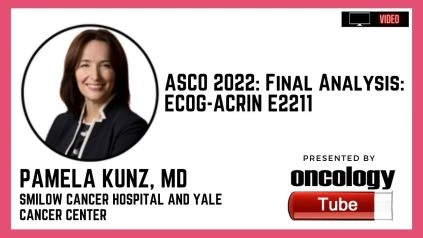Pamela Kunz, MD, Associate Professor of Internal Medicine (Medical Oncology); Director, Center for Gastrointestinal Cancers at Smilow Cancer Hospital and Yale Cancer Center; Vice Chief, DEI, Medical Oncology at Yale University. In this video, she speaks about the ASCO 2022 Abstract – A randomized study of temozolomide or temozolomide and capecitabine in patients with advanced pancreatic neuroendocrine tumors: Final analysis of efficacy and evaluation of MGMT as a predictive biomarker (ECOG-ACRIN E2211).
Â
Origins:
Advanced pancreatic neuroendocrine tumors (NETs) patients have few therapy choices that result in objective tumor response. According to retrospective and modest prospective studies, the combination of capecitabine and temozolomide is associated with high response rates (RR) and relatively lengthy progression-free survival (PFS). The purpose of this experiment was to determine the role of the combination of capecitabine and temozolomide.
Methodology:
The E2211 trial compared temozolomide (200 mg/m2 PO QD days 1-5) to capecitabine/temozolomide (capecitabine 750 mg/m2 PO BID days 1-14; temozolomide 200 mg/m2 PO QD days 10-14) in patients with advanced pancreatic NETs. Eligibility criteria included: metastatic or unresectable pancreatic NETs of low or intermediate grade, progression within the last 12 months, and no prior temozolomide, DTIC, capecitabine, or 5-fluorouracil treatment. The primary goal was PFS; secondary endpoints included OS, RR, safety, and MGMT as measured by immunohistochemistry (IHC) and promoter methylation. Allowing for 5% ineligibility, 145 randomized participants were needed to acquire 138 eligible patients to detect a difference in median PFS of 9 versus 14 months (hazard ratio of 0.64) using a two-sided log-rank test with 81 percent power at the overall 0.20 significance level.
Outcomes:
Between 4/2013 and 3/2016, 144 individuals were randomized to temozolomide (n = 72) or capecitabine/temozolomide (n = 72); the efficacy analysis population included 133 eligible patients. The median PFS for temozolomide was 14.4 months vs. 22.7 months for capecitabine/temozolomide (HR = 0.58), which was adequate to reject the null hypothesis for this final primary objective (stratified log rank p = 0.022). In the final analysis (5/2021), the median OS for temozolomide was 53.8 months and 58.7 months for capecitabine/temozolomide (HR = 0.82, p = 0.42), and the RR was 34% for temozolomide and 40% for capecitabine/temozolomide (p = 0.59). Capecitabine/temozolomide was related with a greater rate of grade 3-4 adverse events (45% vs. 22%, p = 0.005). Low IHC or positive promoter methylation were linked with a higher risk of response (OR [95 percent CI] = 6.38 [2.19, 18.60] and 9.79 [1.09, 87.71], respectively).
Observations:
E2211 is the first prospective randomized trial of capecitabine/temozolomide, and it shows the longest PFS and highest RR observed in a prospective randomized research for patients with pancreatic NETs. MGMT deficit was linked to a higher risk of objective response. NCT01824875 is the clinical trial number.

